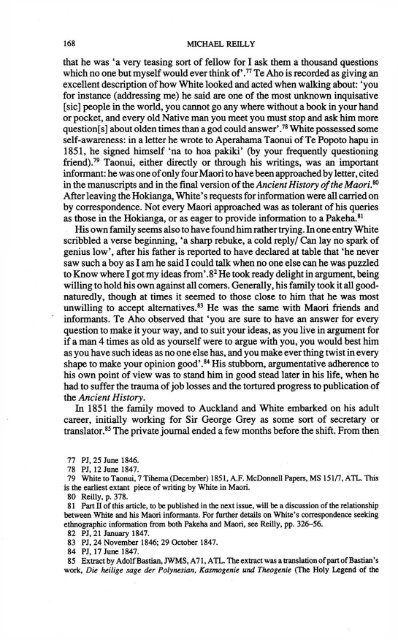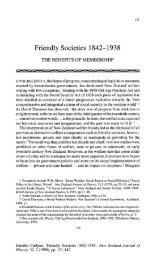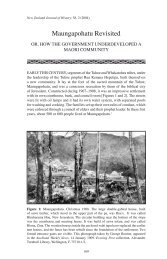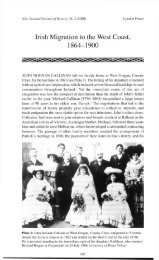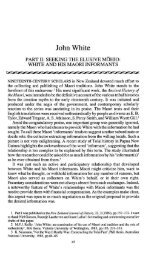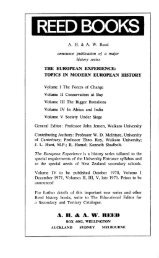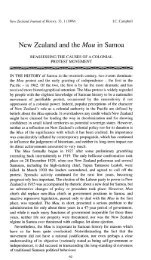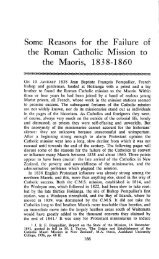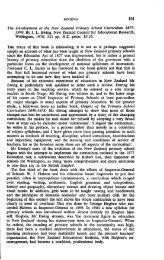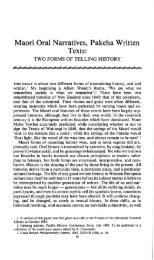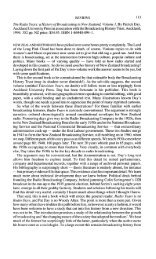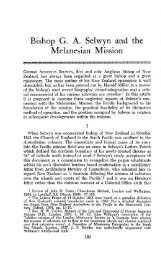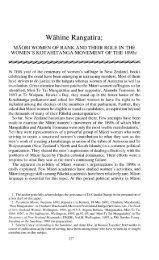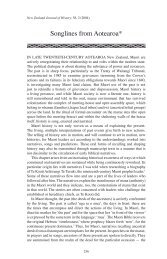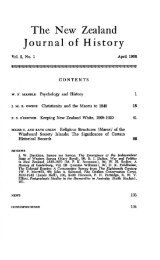John White - New Zealand Journal of History
John White - New Zealand Journal of History
John White - New Zealand Journal of History
Create successful ePaper yourself
Turn your PDF publications into a flip-book with our unique Google optimized e-Paper software.
168 MICHAEL REILLY<br />
that he was 'a very teasing sort <strong>of</strong> fellow for I ask them a thousand questions<br />
which no one but myself would ever think <strong>of</strong>' , 77 Te Aho is recorded as giving an<br />
excellent description <strong>of</strong> how <strong>White</strong> looked and acted when walking about: 'you<br />
for instance (addressing me) he said are one <strong>of</strong> the most unknown inquisative<br />
[sic] people in the world, you cannot go any where without a book in your hand<br />
or pocket, and every old Native man you meet you must stop and ask him more<br />
questionfs] about olden times than a god could answer'. 78 <strong>White</strong> possessed some<br />
self-awareness: in a letter he wrote to Aperahama Taonui <strong>of</strong> Te Popoto hapu in<br />
1851, he signed himself 'na to hoa pakiki' (by your frequendy questioning<br />
friend). 79 Taonui, either directly or through his writings, was an important<br />
informant: he was one <strong>of</strong> only four Maori to have been approached by letter, cited<br />
in the manuscripts and in the final version <strong>of</strong> the Ancient <strong>History</strong> <strong>of</strong> the Maori} 0<br />
After leaving the Hokianga, <strong>White</strong>'s requests for information were all carried on<br />
by correspondence. Not every Maori approached was as tolerant <strong>of</strong> his queries<br />
as those in the Hokianga, or as eager to provide information to a Pakeha. 81<br />
His own family seems also to have found him rather trying. In one entry <strong>White</strong><br />
scribbled a verse beginning, 'a sharp rebuke, a cold reply/ Can lay no spark <strong>of</strong><br />
genius low', after his father is reported to have declared at table that 'he never<br />
saw such a boy as I am he said I could talk when no one else can he was puzzled<br />
to Know where I got my ideas from'.8 2 He took ready delight in argument, being<br />
willing to hold his own against all comers. Generally, his family took it all goodnaturedly,<br />
though at times it seemed to those close to him that he was most<br />
unwilling to accept alternatives. 83 He was the same with Maori friends and<br />
informants. Te Aho observed that 'you are sure to have an answer for every<br />
question to make it your way, and to suit your ideas, as you live in argument for<br />
if a man 4 times as old as yourself were to argue with you, you would best him<br />
as you have such ideas as no one else has, and you make ever thing twist in every<br />
shape to make your opinion good'. 84 His stubborn, argumentative adherence to<br />
his own point <strong>of</strong> view was to stand him in good stead later in his life, when he<br />
had to suffer the trauma <strong>of</strong> job losses and the tortured progress to publication <strong>of</strong><br />
the Ancient <strong>History</strong>.<br />
In 1851 the family moved to Auckland and <strong>White</strong> embarked on his adult<br />
career, initially working for Sir George Grey as some sort <strong>of</strong> secretary or<br />
translator. 85 The private journal ended a few months before the shift. From then<br />
77 PJ, 25 June 1846.<br />
78 PJ, 12 June 1847.<br />
79 <strong>White</strong> to Taonui, 7 Tihema (December) 1851, A.F. McDonnell Papers, MS 151/7, ATL. This<br />
is the earliest extant piece <strong>of</strong> writing by <strong>White</strong> in Maori.<br />
80 Reilly, p. 378.<br />
81 Part II <strong>of</strong> this article, to be published in the next issue, will be a discussion <strong>of</strong> the relationship<br />
between <strong>White</strong> and his Maori informants. For further details on <strong>White</strong>'s correspondence seeking<br />
ethnographic information from both Pakeha and Maori, see Reilly, pp. 326-56.<br />
82 PJ, 21 January 1847.<br />
83 PJ, 24 November 1846; 29 October 1847.<br />
84 PJ, 17 June 1847.<br />
85 Extract by Adolf Bastian, JWMS, A71, ATL. The extract was a translation <strong>of</strong> part <strong>of</strong> Bastian's<br />
work, Die heilige sage der Polynesian, Kasmogenie und Theogenie (The Holy Legend <strong>of</strong> the


